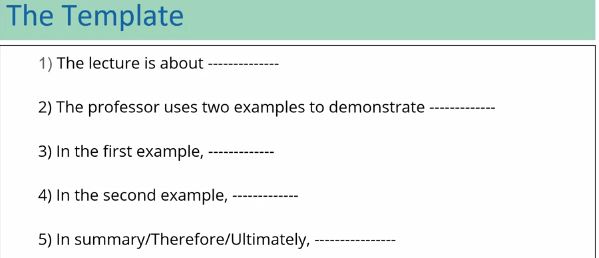COURSE 2 TOEFL Speaking and Writing Sections Skills Mastery
Question 1 How many integrated speaking tasks are in the speaking section?
3
Question 2
How much preparation time is allotted for the campus conversation question?
30 seconds
Question 3 For your integrated tasks, your response time will be ________ .
60 seconds
Question 4 Is the following statement true or false?
In the last speaking question, the summary question, there is no reading required before you listen.
True
Question 5 Is the following statement true or false?
In the integrated questions, you can express your personal opinions and/or preferences.
False
My comment: 建议ETS把 speaking and writing 全部取消。这样的文章不如不写。这样的模板训练有极大的坏处。
The Independent Task:
After 15 seconds have passed, you'll hear a beep, and you will then have 45 seconds to deliver your response. On-screen clock keeps track of time, a second beat will tell you that you should stop speaking. After that, you'll see the prompt for the next question.
You will not be penalized if you have not finished your response when the time is up, as long as you have completed most of the task as given in the prompt.

Scoring criteria used by the readers include, delivery, language use, and topic development.
- Delivery is about how clear your speech is. Good responses are those in which the speech is clear with good pronunciation, natural pacing, and natural sounding intonation patterns.
- Language use depends on how effectively you use grammar and vocabulary to convey your ideas. Readers will be listening for how well you can control both basic and more complex language structures and use appropriate vocabulary.
- Topic development is about how fully you answer the question and how coherently you present your ideas. Good answers generally use all or most of the time allotted and the relationship between ideas and the progression from one idea to the next is clear and easy to follow.


For example, you can say, in my opinion, X is better than y because, or personally, I enjoy X for two or three reasons. Or you can say I enjoy or I like X because. Or my best or my favorite X is, and rest of the sentence. Or you can say, I would like to, and then use a verb, the action, and then the reason, because. Another option is personally, I believe X is better than Y, for two or three reasons. In my opinion, X seems to be better than Y because, or you can say, I prefer, or I would prefer X over Y because, and then the rest of the sentence. Finally, another option is to me, X is better, opinion, than Y, and I feel this way for two or three reasons. Remember, these are all suggested templates, and there is no right or wrong answers.

Step two, this part is optional if you have already included the number of reasons, in your previous sentence. If you have not, then you can introduce the number of reasons you have for selecting your subject. Examples are, like one, I feel this way for two or three reasons. Or the second example is, this is because of two or three reasons. Or another option is, I have two or three reasons.
Step 3: for example, mention the example or a first off, write the reason, for instance, support your answer with examples, or for one. Again, write your reason. That is, followed by example. My first reason is that, mention the reason here, what I mean is that, here provides some details. Or you can say for one and then mention the first reason. Then for instance, explain your example. Finally, you can say one reason is that, put your sentence here. What I mean by this is that, and here you will explain exactly what you mean.
Integrated Speaking Questions
The first integrated task or question number two is frequently called the “campus question.” You will read a passage about a campus-related topic. Next, you will listen to a conversation about that topic. You will then have 30 seconds to prepare your response and 60 seconds to speak your answer. For question two, where you have both reading and listening passages, you will be asked what the opinion is of a speaker in the listening passage, and you’ll need to explain how that person’s opinion relates to the issues presented in the reading passage.
In question three, you will read a passage about an academic subject. The reading passage will always be about an important academic term or concept that might be found in a college textbook. Next, you will listen to part of a lecture on that same subject. You will then have 30 seconds to prepare your response, and 60 seconds to speak your answer.
In question four, you will listen to part of a lecture which is followed by a question. Next, you will have 20 seconds to prepare your response and 60 seconds to speak your answer, which will always be a summary of the lecture. Now, let’s look more closely at what these academic-courses questions look like and what they will be asking you to do.
Please go through the questions in the given sample test so that you can watch the videos with better understanding of what the questions look like. This sample test is available on the ETS website. It will take approximately 17 to 20 minutes to complete all four speaking tasks. The following link will take you to the website where you can download the test.

































No comments:
Post a Comment